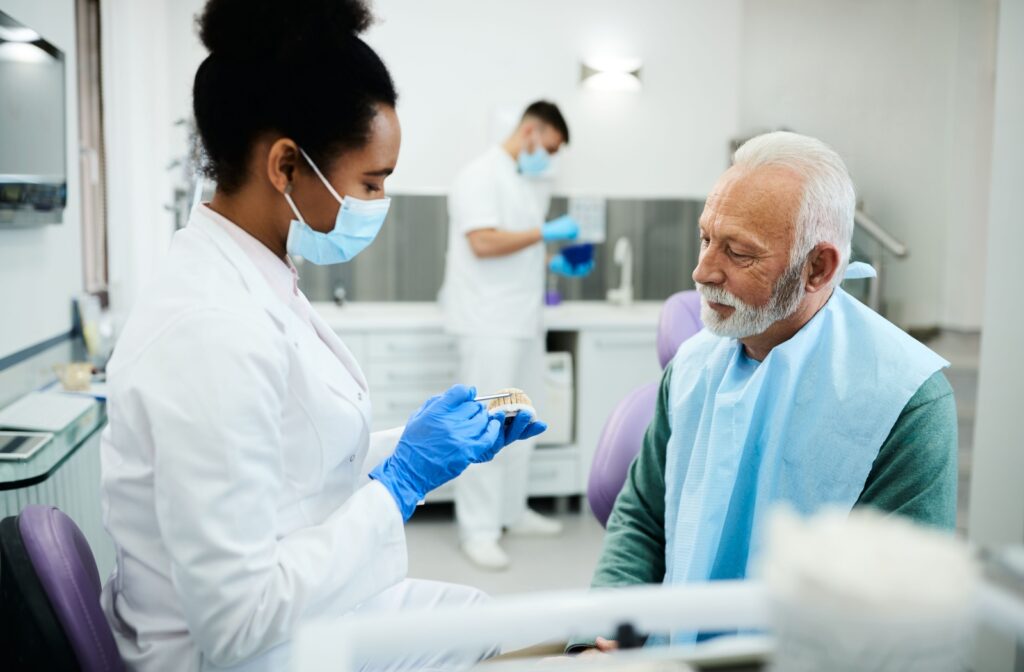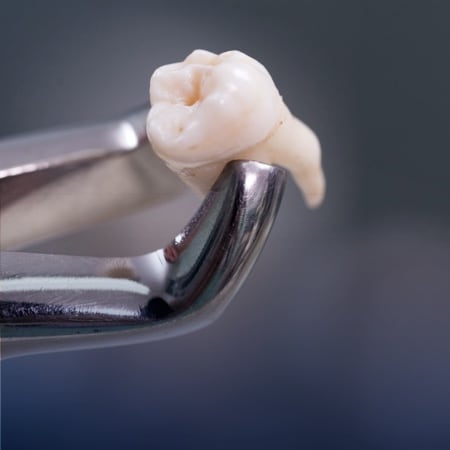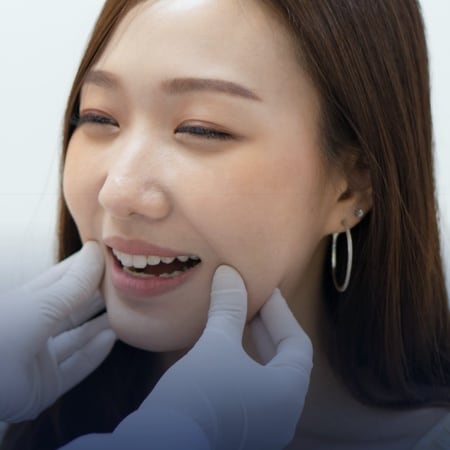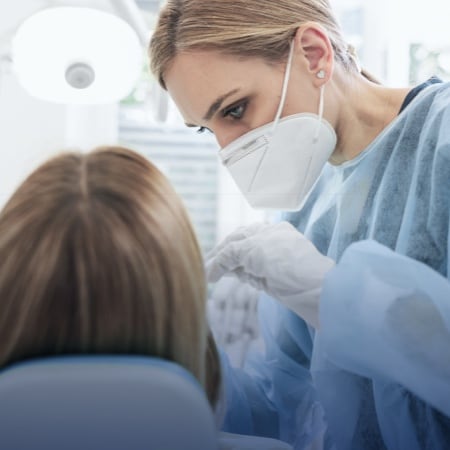Dental implants offer a long-term solution for those looking to restore their oral health, improve functionality, and regain a bright smile. These implanted tooth roots provide a sturdy foundation for replacement teeth that look, feel, and function like natural teeth.
But while dental implants can be a fantastic option for many, they aren’t suitable for everyone. Some things that may not make you a good candidate for dental implants can include:
- Insufficient jawbone without a willingness for bone grafting
- Poor oral health
- Continued Smoking
- Health conditions impacting healing
- Medication interference
- Bruxism (teeth grinding)
While these factors may affect your candidacy for implants, there are various other dental treatments that can help you achieve your smile goals.
What Are Dental Implants?
Dental implants consist of titanium posts surgically inserted into the jawbone to act as artificial tooth roots. Once healed, these implants support crowns, bridges, or dentures, providing a durable and natural-looking solution for missing teeth.
Some of the benefits of dental implants include:
- Lasting durability (10 years or more) when properly cared for
- Improved chewing ability, making it easier to eat your favourite foods
- Preservation of jawbone health by preventing bone loss
- A natural appearance that blends seamlessly with your natural teeth
Who Is a Good Candidate for Dental Implants?
The ideal dental implant candidate shares a few common characteristics. Generally, if you’re healthy enough to undergo routine oral surgery and maintain good oral hygiene, you’re likely a strong candidate for implants. Here are the key factors oral surgeons look for:
Adequate Jawbone Density
Healthy jawbone tissue is essential for dental implants to fuse correctly and remain secure. A healthy and dense jawbone provides a stable foundation for the implant.
Good Oral Hygiene
Candidates who maintain regular brushing, flossing, and dental checkups are more likely to experience long-term implant success. Consistent oral hygiene helps prevent infections that could jeopardize the implant.
Non-Smoker
Non-smokers tend to have better outcomes, as smoking can interfere with the healing process and increase the risk of implant failure.
Overall Good Health
A healthy immune system and stable medical conditions are important for proper healing after implant surgery. If you’re in good health, this often signals a better chance for success.
Commitment to Aftercare
Receiving dental implants is only the first step. Good candidates recognize that consistent post-surgical care is just as important in maintaining their investment for years to come.
Common Misconceptions About Dental Implant Candidacy
Myth: “I’m too old for dental implants.”
Age is not usually a disqualifier. Many older adults enjoy successful implants, as long as they meet the health criteria.
Myth: “If I’ve lost some jawbone, I can’t get implants.”
While a healthy jawbone is important, bone grafting procedures can often restore the necessary density, making implants possible.
Myth: “Implants are painful.”
Thanks to modern dental sedation techniques, the procedure is typically less painful than people imagine. Most experience discomfort similar to tooth extraction, with downtime lasting just a few days.
Myth: “I was a smoker, but have already quit or am quitting.”
CVOS oral surgeons place thousands of dental implants each year. Unlike general dentists who may place an implant periodically, the extensive expertise and knowledge of CVOS’s surgeons allows them to successfully place dental implants even in patients who may have more complex medical histories or risk factors.
Who Isn’t a Good Candidate for Dental Implants?
Though dental implants are widely accessible, certain health conditions, behaviours, or factors may reduce eligibility.
While these factors may temporarily or permanently disqualify someone, your oral surgeon can evaluate your situation and make a personalized recommendation.
Insufficient Jawbone Without a Willingness for Bone Grafting
If your jawbone is too thin or weak to support an implant and you are unwilling to undergo bone grafting, implants may not hold up securely.
Poor Oral Health
Severe gum disease, untreated cavities, or chronic oral infections can make dental implant success less likely. Oral health must be addressed before proceeding with implants.
Smoking
Smoking impairs healing and increases the probability of implant failure. Smokers who are committed to quitting may still pursue implants, but it’s important to stop before and after surgery.
Health Conditions Impacting Healing
Conditions like uncontrolled diabetes, immune disorders, and bleeding disorders may slow healing and raise the risk of complications. If managed appropriately, some people with these conditions may still qualify.
Medication Interference
Certain prescriptions might affect bone healing and reduce the success rate of implants.
Bruxism (Teeth Grinding)
Chronic teeth grinding can place undue pressure on implants, potentially causing them to fail.

Alternatives to Dental Implants
Not eligible for implants? That’s okay—other effective ways exist to achieve a beautiful, functional smile. Alternatives can include:
- Dental bridges: A less invasive option to replace one or more teeth without requiring implants.
- Partial or full dentures: A more budget-friendly option to restore your smile, though less permanent than implants.
- Snap-on dentures: A hybrid solution that uses remaining teeth or mini-implants for stability.
Each option has pros and cons, so work with your oral surgeon to choose the one that aligns with your oral health and lifestyle needs.
A Healthier Smile Is Within Reach
If you’ve been considering dental implants but aren’t sure whether you’re a good candidate, the next step is a consultation. Your general health and oral well-being will be key in determining your eligibility.
At CVOS Oral Surgery, we’re here to guide you every step of the way. Whether you’re an ideal candidate or need to explore alternatives, our surgeons combine care, years of experience, and modern technology to help you achieve a healthier smile.
Contact us today, or ask your dentist for a referral to CVOS Oral Surgery. Together, we can build a solution tailored to your needs.










